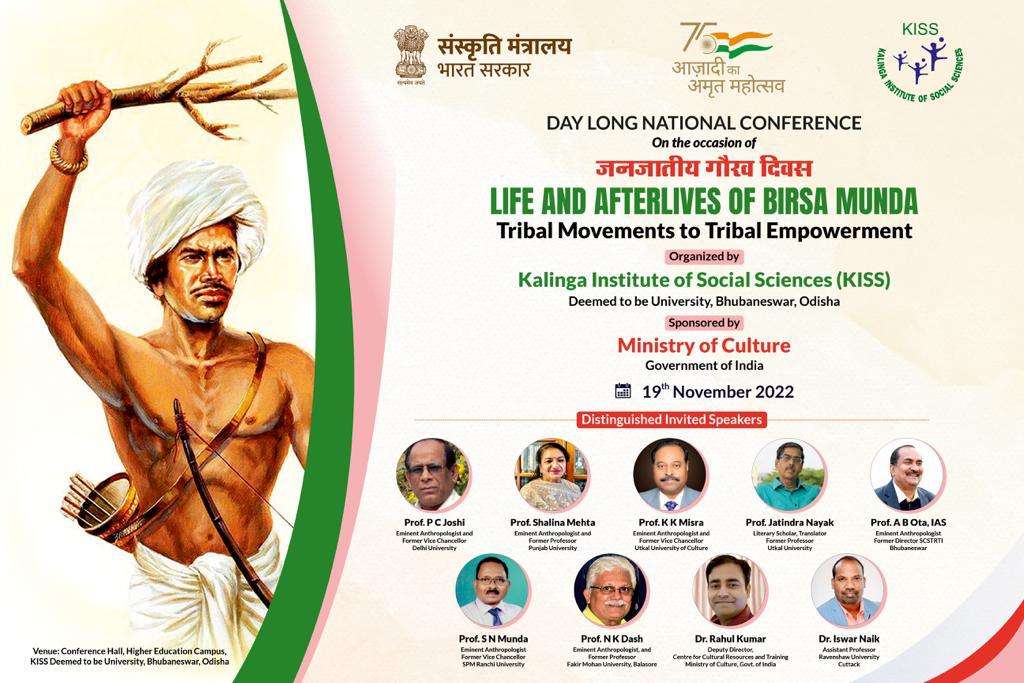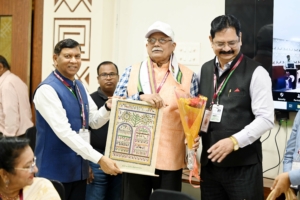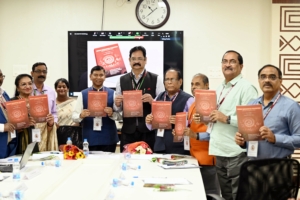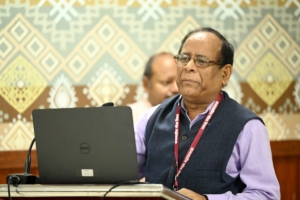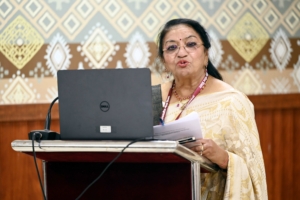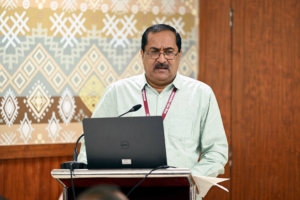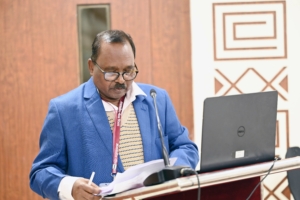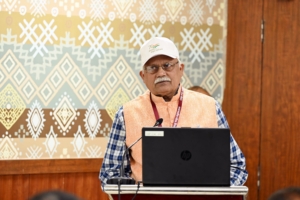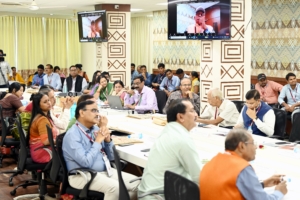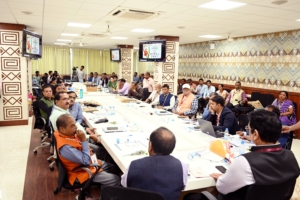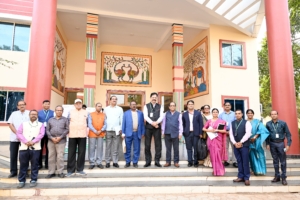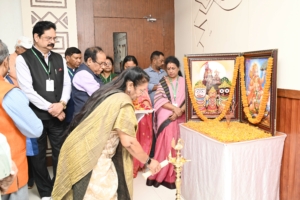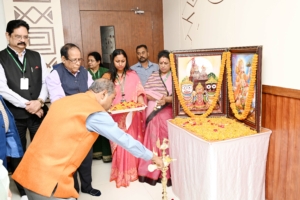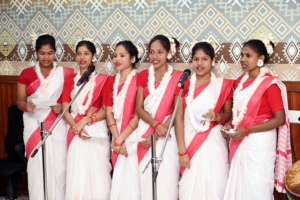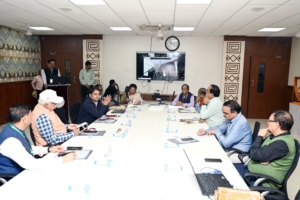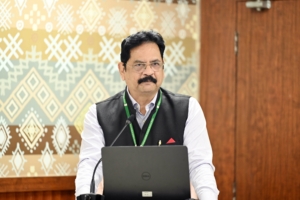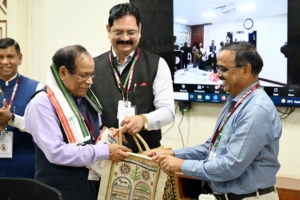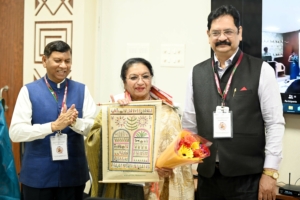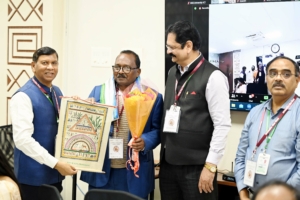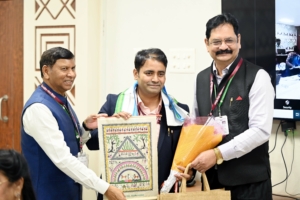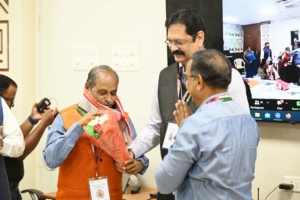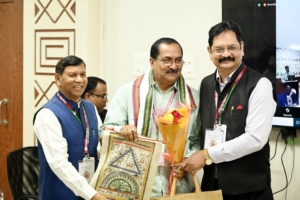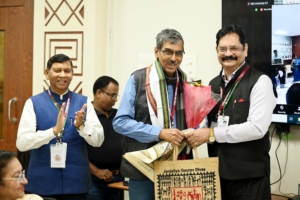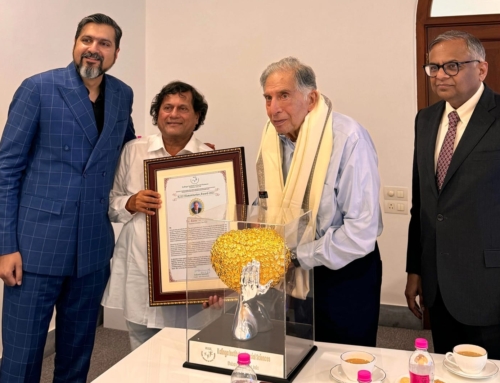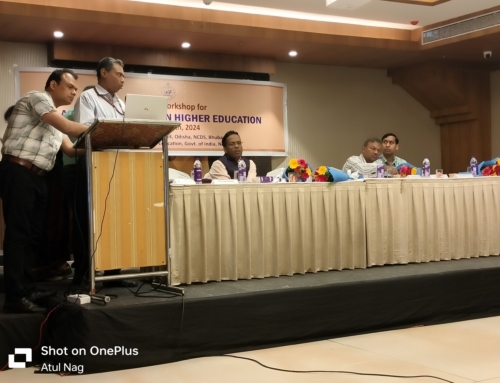Kalinga Institute of Social Sciences (KISS) Deemed to be University, Bhubaneswar organised a day-long conference on ‘Life and Aferlives of Birsa Munda – Tribal Movements to Tribal Empowerment’ on 19th November 2022. The conference was part of a series of statewide events on the Janjatiya Gaurav Divas hosted by KISS-DU from 15th to 20th November 2022, with support from the Ministry of Culture, Government of India, to pay homage to the contributions of India’s tribal freedom fighters. The Janjatiya Gaurav Diwas is a part of the Azadi Ka Amrit Mahotsav, the flagship programme of the Government of India, to celebrate and remember the contributions of the unsung heroes who had contributed immensely towards the freedom struggle. This conference on the “Life and Afterlives of Birsa Munda – Tribal Movements to Tribal Empowerment was attended by eminent anthropologists, former Vice Chancellors and Professors and Research Scholars from across the country.
Speaking at the Inaugural Session, Professor Deepak Kumar Behera, Vice Chancellor, KISS Deemed to be University, in his Welcome Address spoke the initiatives taken by KISS-DU for the protection, preservation and promotion of tribal languages, cultures, and ethnicities. He too highlighted the vision and mission of Hon’ble Founder, KISS and KIIT, Professor Achyuta Samanta. He also spoke about innovative activities undertaken by seven Innovative Schools, seven Innovative Centers, Tribal Advisory Council, Professors of Practice, Tribal Working Committee, Mother tongue-based Multilingual Lab of KISS Deemed to be University. One of the Co-Convenors of the conference, Dr. Anirban Bandopadhyay, Associate Professor at KISS-DU, set the context of the conference for the attendees with a brief introduction on the life and expectations of the day. The revered guests released KISS-DU’s Bulletin, “Adivasi Sanskrutik Parampara” on Janjati Gourav Divas, celebrating the numerous innovative ‘one-of-a-kind’ initiatives that the university has undertaken in its continual journey towards academic and research excellence. These include the constitution of a Tribal Advisory Council, engagement of Professors of Practice and Professors Emeriti, among others.
Professor P.C. Joshi, Eminent Anthropologist and Former Vice Chancellor, Delhi University, who also served as session chair for the first quarter of the day, formally commenced the conference with the delivery of the introductory comments. He expressed his gratitude to the Founder, KISS and KIIT for organizing such a momentous event. In his address, he said that Birsa Munda is as a symbol of struggle of Adivasi brothers and sisters. He too shared some of his experiences of his school days by reminding the audience on the contributions of tribal people in producing varieties of rice for us. He also appreciated the steps taken by the Ministry of Culture, Govt. of India on this very occasion.
Professor Shalina Mehta, Eminent Anthropologist and Former Professor, Punjab University on “Power and Contestation in the formation of Adivasi Identity”. During her address, Professor Mehta spoke about ‘Power and Contestation in the formation of Adivasi Identity’. At the outset, she appreciated the amazing activities of the KISS which is beyond to believe unless one sees it. She saluted the magician Professor Achyuta Samanta who materialized his dream into reality. She also expressed her concerns about the traumatic conditions of the tribal and the false promises of the institutions and non-adivasi individuals. She did not hesitate to expose the hypocrisy of the bureaucrats and so-called mainstream people. She criticized the people who call the adivasis savages and barbaric. She too said how the identity of the tribal has been outraged and they are neglected and left for perversion. Highlighting the tribal heroes like Birsa Munda, Sidhu and Kanhu, she reminded their contributions in the freedom struggle. Birsa’s protest and fight against the British was not a Munda rebellion but a rebellion against colonial hegemony. She also expressed her worries about Adivasi subjugation which is no less painful than colonial subjugation. She proposed to open an exclusive tribal library.
Professor Akhil Bihari Ota (IAS), Former Director, SCSTRTI – Bhubaneswar, spoke at length on ‘Janjatiya Gaurav Divas: Government Initiatives to Remember Tribal Freedom Fighters’. Therein, he highlighted the genesis of Janajatiya Gourav Divas. He spoke the initiatives of the Govt. of India to celebrate the Janajatiya Gourav Divas. He also about the various activities of the Govt. India as a mark to respect the tribal of India. Along with creation of museums, the Govt. has taken tribal heritage centers and many such steps is a step towards the total commitment to the marginalized section of the society. He expressed his desire to highlight the unsung tribal heroes and if necessary, history may be rewritten. Prof. Ota also threw light on Government policies for the protection, preservation and promotion of tribal language, culture and heritage. He delineated the contribution of Birsha Munda against conversation and against the colonial power. He is of the opinion that the National PVTGs Museum to be established in KISS. He too informed the audience that Govt. of India honored the young tribal hero Birsa Munda as the icon of the tribal people.
Dr. Rahul Kumar, Deputy Director, Center for Cultural Resources and Training, Ministry of Culture, Government of India, spoke on ‘Remembering the contributions of the Unsung Heroes of India’s Freedom Struggle on Janjatiya Gaurav Divas: Digital District Repository (DDR) Project of Ministry of Culture, Government of India’. In his talk, Dr. Kumar touched upon the “Remembering the Contributions of the Unsung Heroes of India’s freedom Struggle on Janjatiya Gourav Divas: Digital District Repository (DDR) Projects of Ministry of Culture, Government of India’. He at the outset spoke the objective of celebrating Janjatya Gourav Divas. He highlighted the contributions of Birsa Munda in emancipating tribal people. He was acclaimed as Dharti Aba (Father of Earth) whose heart was crying for his own people. He highlighted the Digital District Repository (DDR) under the Centre for Cultural Resources and Training (CCRT) project of Government of India. He emphasized on the rewriting of History paying importance to the unsung tribal heroes. This project is an attempt to discover the tribal heroes at micro level. In addition, he stressed that local history should be written. Documentation of unwritten tribal stories has been encouraged in the project and therefore he urged the scholars and researchers of KISS to author stories. He further spoke about the nature and content of the project.
This was followed by an address by Professor S. N. Munda, Eminent Anthropologist and Former Vice Chancellor, SPM Ranchi University spoke on ‘Indigenous Knowledge and the Struggle of Birsa Munda for Abuah Dissum (Our Country)’. Professor Munda, in his address, commented on “Indigenous Knowledge and the struggle of Birsa Munda Abuah Dissum (our country)”. He highlighted the indigenous knowledge of the tribal. He spoke about the process of preservation of foodstuff, use of medicinal plants and process of agriculture and many such indigenous knowledge. He spoke about Birsa’s birth, upbringing, education, social practices and revolt against the exploitation of the British Raj in India. He spoke the life sketch, career graph and contributions of Birsa Munda to the society. He urged the audience to follow the footsteps of Birsa Munda for the development of the nation.
Professor N. C Dash, an Eminent Anthropologist and Former Professor, Fakir Mohan University, Balasore. In his commentary Professor Dash reiterated the fact that the indigenous knowledge system has been undermined. He further urged for the restoration of indigenous knowledge. He too favored the rewriting of History. The Session Chair, Professor P.C. Joshi in the Question-answer session and Concluding Remarks appreciated the speakers’ wonderful deliberations and emphasized upon the historical wrongs to be corrected.
Thereafter, in the post lunch session an introductory remark was delivered by the Session Chair, Professor Shalina Mehta and Subsequently, Professor P. C. Joshi, Eminent Anthropologist and Former Vice Chancellor, Delhi University, delivered his address on ‘India’s Freedom Struggle and Adivasis’. In his talk, Professor Joshi addressed highlighted the bravery of the unsung tribal heroes. He said that it was time to discover them and commemorate their sacrifices in nation building. He said that the nation demined the contributions of the tribal people. He also highlighted the pains and penalties, trials and tribulations and sorrows and sufferings of the tribal over the years. He took the names of some the tribal leaders who were the architects of India. He told about the culture and tradition of India citing the examples from Indian mythology. He stressed on the fact that looking at the tribal culture, tradition and heritage from tribal perspective is the call of the hour.
This was followed by an address by Professor K. K. Misra, Eminent Anthropologist and Former Professor, Hyderabad Central University, spoke on ‘Tribal Movements in India: Revisiting Theories and Methods’. Therein, he highlighted He appreciated the attempt of the Govt. of India to rewrite history by incorporating the contributions of the unsung tribal and non-tribal heroes in freedom struggle. He spoke about the self-governing Adivasis. He then highlighted series freedom movements and the contributions of the tribal. Interference of non-tribal people in the life of the tribal really subjugated the innocent tribal. He too said about the rights of the tribal people. Crisis of tribal autonomy and tribal identity make the tribal, foreigners in their own land. Addressing the issues of the tribal is the need of the day.
The first address of the last quarter of the day, with an address by Dr Iswar Chandra Naik, Assistant Professor at Ravenshaw University, Cuttack, on ‘Tribal Movements in India – Remembering Dharti Aaba Birsa Munda’. In his talk, Dr. Naik examined spoke on the types of tribal movements, tribal revolts of Odisha and beyond. He too said about the causes, modes, and consequences of various tribal movements. He spoke about the movements of the tribal against the alien rule and zamindars. He stressed on the identity crisis of the tribal on their own land.
The last presentation of the evening was by Professor Jatindra Nayak, a Literary Scholar, Translator, and Former Professor, Utkal University on: ‘At Odds with the World: Imagining and Constructing the Tribal Identity’. Therein, he examined started his deliberation with colonial narratives. He expressed concerns over the narratives of the general people who used to say Adivasis as Anaryas. He urged the tribal to build their narratives instead of being biased by others’ glorified narratives and therefore narratives should be reconstructed. Professor Salina Mehta concluded the session by summarising the talks delivered by the speakers of the sessions. She expressed her gratification over the day’s programme and signed out with a great gesture. She suggested to conduct more seminars on such topics.
Dr. Prashanta Kumar Routray, Registrar, KISS-DU delivered a Vote of Thanks to the dignitaries present in the seminar. He spoke on KISS’s contribution to the tribal society. He further shared the vision of Hon’ble Founder, KISS & KIIT. He urged the participants to translate and transect the essence of the discourse in today’s seminar. He further asked the tribal students to be the change agents of their respective areas. Finally, he offered his profound sense of gratitude to the Resource persons, Chair professors, Professor Emeriti, invited guests, faculty members, organizers, ministerial staff, IT personnel and our own young researchers and students for making the Seminar a grand success with their active involvement and participation.

